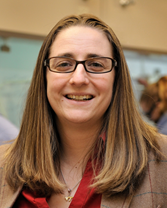
"Redox Hopping Water Oxidation Catalysis by Metal Organic Frameworks"
Metal organic frameworks (MOFs) are supramolecular architectures comprised of metal nodes connected by multi-dentate organic/inorganic linkers. Incorporation of molecular chromophores into these solid-state structures has been exploited to develop luminescent sensors, light emitting diodes, photovoltaics, and photo/electro-catalysts. In terms of catalysis, the high surface area of MOFs can be exploited to produce a higher catalytic rate per geometric area than those realized by other approaches. The crux of catalysis, however, is diffusion. The Morris group has explored the diffusion of electrons and ions through MOFs as a function of applied electric field. The results indicate that under most cases, as expected, ion motion is restricted through the 3D MOF networks. The effect of ion size and electronic self-exchange rates will be presented. Additionally, the effect of 3D MOF structure and pore size will be discussed. We place this discussion in the context of electrocatalytic water oxidation by MOFs through a detailed study of a ruthenium terpyridine bipyridine aquo catalyst modified UiO-67-type MOF. The MOF was competent at water oxidation with a rate constant on par with the homogeneous catalyst. Additionally, the stability of the catalyst was greatly enhanced, and the MOF could be recycled at least 3 time without loss in activity. Follow-up experiments indicate that the catalysis occurs throughout the MOF particles and is not confined to the surface. Ultimately, the catalyst operated at a rate 100 times that of a monolayer of the same catalysts on an electrochemical support. The design parameters for next generation MOF water oxidation catalysts will be presented.
